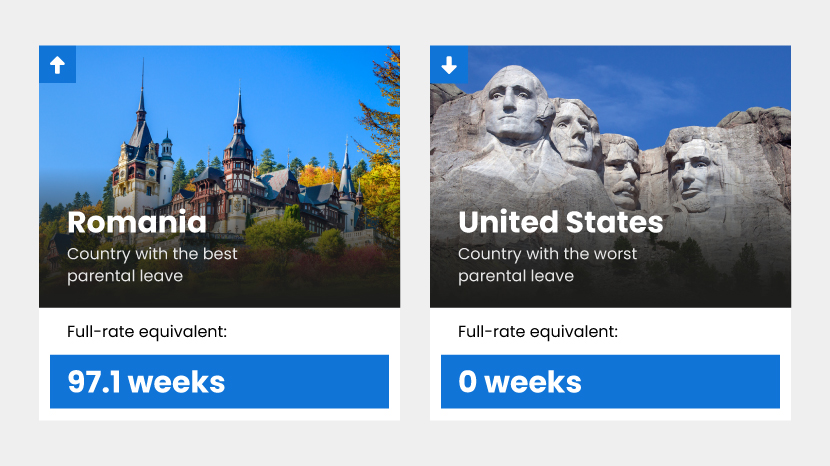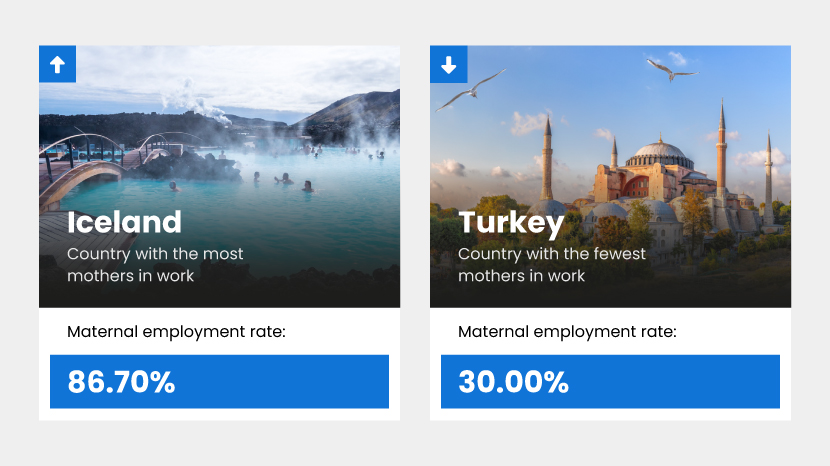Many factors will affect how having children impact’s on your workforce. Family size, for example may be driven by cultural norms or public policy, financial support or workplace leave practices. The UK has ranked 6th worst for parental leave schemes, according to a new study of 43 countries.
The study by confused.com analysed OECD data to reveal how the UK’s ‘typical’ family unit compares to the rest of the world. You can view the full study here: https://www.confused.com/life-insurance/world-family-report
The countries with the worst parental leave
| Mothers | Mothers | Fathers | Fathers | Combined | ||
| Rank | Country | Average payment rate (%) | Full-rate equivalent (weeks) | Average payment rate (%) | Full-rate equivalent (weeks) | Full-rate equivalent (weeks) |
| 1 | United States | 0.00 | 0.00 | 0.00 | 0.00 | 0.00 |
| 2 | Republic of Ireland | 0.27 | 7.60 | 0.14 | 0.50 | 8.10 |
| 3 | Switzerland | 0.58 | 8.20 | 0.00 | 0.00 | 8.20 |
| 4 | Australia | 0.42 | 7.60 | 0.42 | 0.80 | 8.40 |
| 5 | New Zealand | 0.48 | 10.40 | 0.00 | 0.00 | 10.40 |
| 6 | United Kingdom | 0.30 | 11.60 | 0.19 | 0.40 | 12.00 |
| 7 | Mexico | 1.00 | 12.00 | 1.00 | 1.00 | 13.00 |
| 8 | Cyprus | 0.72 | 13.00 | 0.72 | 1.40 | 14.40 |
| 9 | Israel | 1.00 | 15.00 | 0.00 | 0.00 | 15.00 |
| 10 | Malta | 0.86 | 15.40 | 1.00 | 0.20 | 15.60 |
Looking globally, the average parental leave package stands at 32.73 weeks for mothers, and 4.73 for fathers. The US sees the worst parental leave at 0.00 weeks for both parents, whilst Romania sees the best at 92.40 weeks for mothers and 4.70 for fathers.

The UK ranks in 6th place when it comes to the countries with the worst parental leave schemes. In the UK mothers receive 11.60 weeks of fully paid parental leave, whilst fathers receive just 0.40 weeks. Despite this, the UK has the 8th best public family policy among the countries analysed.
The countries with the most families without children
| Rank | Country | Women aged 40-44 without children |
| 1 | Spain | 21.60% |
| 2 | Austria | 21.54% |
| 3 | UK (England and Wales) | 20.00% |
The UK ranks in 3rd place for the countries that see the most couples choosing not to have children. 20.00% of women aged 40-44 across England and Wales are without children, with many choosing to focus on career development. The global average stands at 12.81%, whilst on the opposite end of the scale, Turkey sees the lowest number of couples without children (4.50%).
Further Insights
- The average family size in the UK is 2.30 children, compared to 2.49 globally. Mexico has the highest average family size (3.93), whilst Sweden has the lowest at (1.80).
- 8.54% of households in the UK are single-parent households, compared to 7.28% globally. Latvia has the highest percentage of single-parent households (11.50%), whilst Japan has the lowest (2.63%).
- 50.77% of households in the UK are couple households, compared to 53.03% globally. Israel sees the most couple households (66.60%), whilst Latvia sees the least (39.38%).
- 48.2% of births in the UK take place outside of marriage, compared to 40.35% globally. Chile sees the most births outside of marriage (73.70%), whilst South Korea sees the least (2.20%).
- 74.20% of UK mothers are in work, compared to 70.58% globally. Iceland has the highest maternal employment rate (86.70%), whilst Turkey has the lowest (30%).

Workplace Wellbeing Professional is an online magazine featuring news and analysis on a broad range of employee wellbeing topics, focused on a UK based audience.


